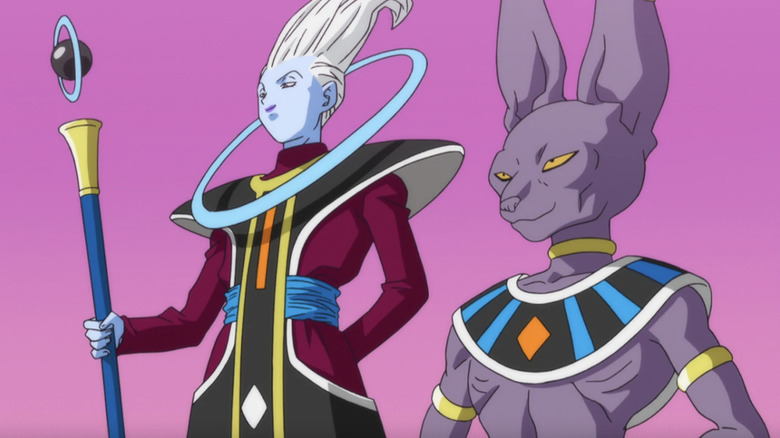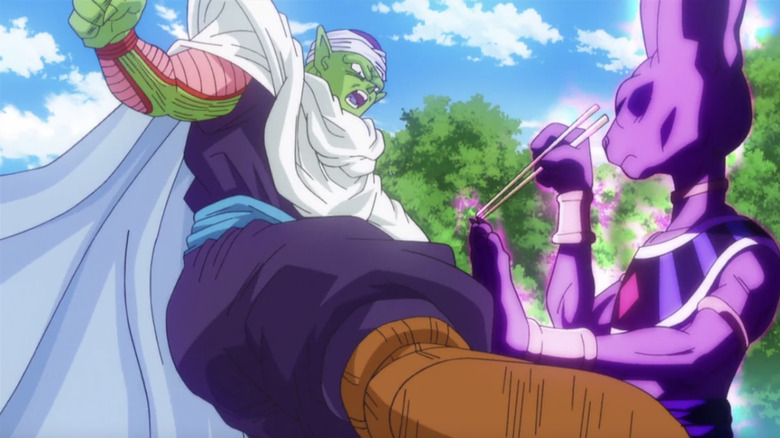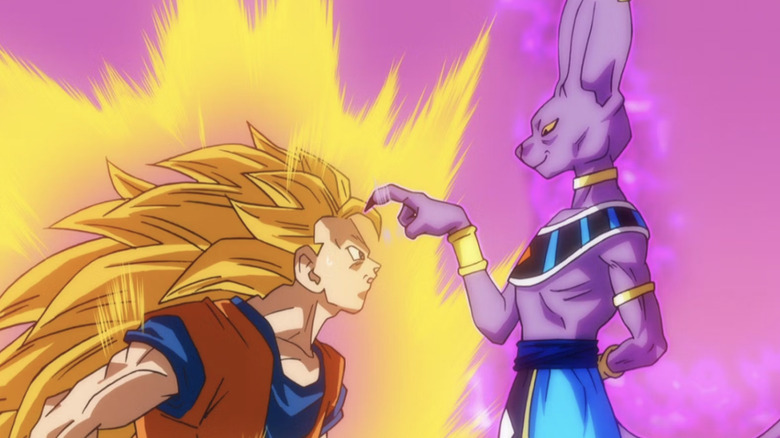Some Of Battle Of The Gods' Best Moments Came From Putting Constraints On Dragon Ball Z
"Dragon Ball Z: Battle Of The Gods" marked a new era for the world of "Dragon Ball." The Shonen would breathe new life into its world with wholly new characters and, more importantly, a new transformation for Goku to discover through sheer will and a lot of Saiyan screaming. The film had a lot of hype surrounding it, being the first "Dragon Ball" film to have a theatrical release in 17 years, and the story would revolve around — wouldn't you know it — Goku fighting a terrifyingly powerful opponent. It's the same tried and true formula used by nearly every "Dragon Ball" film, so the success of any story in the franchise depends on whether the opponent is interesting. This time around, it's the God of Destruction, Lord Beerus. Having heard of Frieza's defeat at the hands of Goku, Beerus heads to Earth looking for an opponent that could finally challenge him.
"Battle Of The Gods" helped set the stage for "Dragon Ball" creator Akira Toriyama and artist Toyotarou to release the "Dragon Ball Super" manga, which at the time of this writing, is still ongoing (even if the anime has concluded). The film provides different rules of engagement for Goku and his fight with Lord Beerus. And there's also a creative fight scene that involves Beerus dispatching a bevy of "Dragon Ball" supporting characters not with Kamehamehas, but with chopsticks.
Chopsticks over spirit bombs
Tadayoshi Yamamuro, who served as an animation supervisor for "Dragon Ball Z: Battle Of The Gods," spoke in an interview translated by Kanzenshuu about how the fight between Beerus and the cast of "Dragon Ball" required a different kind of style than usual fisticuffs to avoid collateral damage:
"I thought, if they fire an energy blast at the party, it would destroy the site and nearby buildings, so [I need] a way for them to be able to fight just with their limbs... so I tried putting in some locking techniques, which is rare for Dragon Ball. At first, in the scenario, it was written that 'Beerus deals with Piccolo, Tenshinhan, and No. 18 with a spoon or fork', but it would be difficult to fight that way, so I asked the director Masahiro Hosoda, 'would chopsticks be all right?' and got the OK, so I put in some action where [Beerus] grabs and throws them like Jackie Chan. I was able to handle the storyboards for this part, as well, so I was able to draw it comparatively freely and was satisfied with it."
Lord Beerus was a different kind of opponent for Goku and the rest of the "Dragon Ball" crew — the character's immense power meant that even characters like Goku could not truly defeat him. Moreover, Beerus would quickly destroy everything around him if he felt like it, which led to the need for creatively choreographed fight sequences that showed restraint.
Honoring what came before
The fight scene in question is both hilarious and terrifying, as characters we've come to know as powerhouses were taken down by Beerus with a pair of chopsticks. Watching Piccolo get hit in all his pressure points by cutlery is the kind of entertainment only "Dragon Ball" can provide. More than that, though, the sequence is a testament that this particular "Dragon Ball" film has an essential understanding of its roots.
The animation supervisor references Jackie Chan, the legendary filmmaker, choreographer, and inspiration for "Dragon Ball." Akira Toriyama has implied as much, giving credit to Chan for being partially responsible for the franchise's existence. The balance of action and comedy found in Jackie Chan films like "Drunken Master" helped to inspire the tonal balance of the original "Dragon Ball" manga.
The series evolved from that point into the Shonen it is today, with more of a focus on battles of sheer strength and willpower. However, it's comforting to see that when it comes time to subvert the expectations of a fight to show a character's restraint, the anime can return to its roots. Lord Beerus and his clever use of chopsticks came from a place of ingenuity that also honored the legacy of "Dragon Ball" and its humble beginnings as a comedy.


